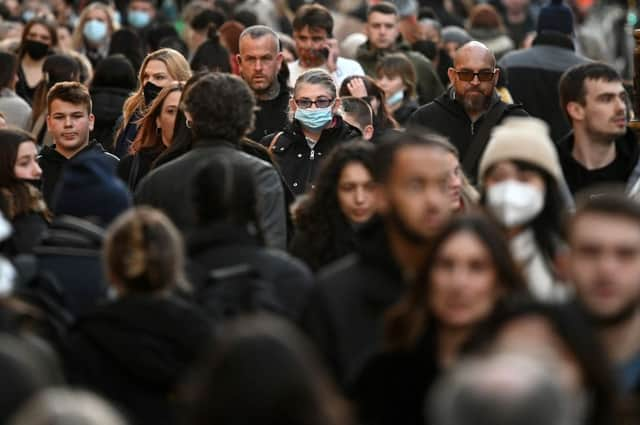Calls to cut Covid self-isolation to 5 days after US makes rules change


The UK government is facing calls to cut the Covid-19 self-isolation period down even further to just five days, in a bid to protect the NHS.
The move would follow in the footsteps of the United States where the Centre for Disease Control (CDC) has slashed the isolation requirement from 10 days to five providing people are not showing symptoms. Masks must also be worn for a further five days.
Advertisement
Hide AdAdvertisement
Hide AdIn England, the isolation period for people who test positive for coronavirus has already been reduced, dropping from 10 days to seven just before Christmas.
The rule change means people are now able to leave quarantine if they get two negative lateral flow tests on day six and seven, 24 hours apart.
However, in Scotland, Wales and Northern Ireland, the isolation period is still 10 full days.
‘NHS staff absences pose biggest threat’
The calls to reduce the isolation period comes following warnings that NHS staff absences due to Covid-19 could pose a bigger threat to the health service than patients needing treatment for the virus.
Advertisement
Hide AdAdvertisement
Hide AdNHS Providers chief executive Chris Hopson said: “What we’re seeing is in some hospitals we’re now having to redeploy staff to fill the gaps that are being left in critical and essential services by staff who are off with Covid-related absences.”
Earlier Paul Hunter, professor in medicine at the University of East Anglia, said that eventually self-isolation rules would have to be eased as people learned to live with the virus.
He told the BBC: “Ultimately, we’re going to have to let people who are positive with Covid go about their normal lives as they would do with any other cold. And so, at some point, we’ve got to relax this.
“If the self-isolation rules are what’s making the pain associated with Covid, then we need to do that perhaps sooner rather than later. Maybe not quite just yet.”
Advertisement
Hide AdAdvertisement
Hide AdMeanwhile, the president of the Confederation of British Industry (CBI) has said people who test positive for Covid-19 should be required to self-isolate for as little time as possible.
Lord Bilimoria welcomed the decision by Health Secretary Sajid Javid to reduce the isolation time in England to seven if people test negative on days six and seven, and pointed out that in South Africa, where the Omicron variant was first identified, the requirement to self-isolate has been dropped altogether when people are asymptomatic.
He told BBC Radio 4’s PM programme: “We have got to do everything we can to stop the disruption to our lives and to our livelihoods and to the economy in as safe a way as possible.
“We need people to isolate for as little time as possible.”
Decision must be backed by ‘clear evidence’
An NHS leader has warned that a decision to cut the self-isolation period to five days must be “based on very clear evidence” that it will not drive a rise in infections.
Advertisement
Hide AdAdvertisement
Hide AdMatthew Taylor, chief executive of the NHS Confederation, acknowledged staff absence “is a huge issue for the NHS right now”, but said the case for amending isolation rules even further needs to be made clear.
Mr Taylor said the risks need to be assessed before any rule change is made and noted that while evidence suggests the Omicron variant causes milder disease, Covid-related hospital admissions are still rising.
Speaking to BBC Radio 4’s Today programme, he said: “The news about the acuity of those patients is good.
“It seems as though they are suffering less bad symptoms, and indeed many people who’ve got Covid are not coming to hospital because of Covid and it’s then been subsequently found out – that’s good.
Advertisement
Hide AdAdvertisement
Hide Ad“It’s also important to recognise the hospitals are full of people who are very vulnerable and, for those people, even a relatively mild form of the virus can have serious consequences, so whilst anyone in the NHS would be delighted if people were able to come back to work earlier, if they are safe, we need to be absolutely sure that that is the case.”
Shadow work and pensions secretary Jonathan Ashworth also agreed that a decision on reducing the Covid isolation period should not be rushed.
He told Sky News: “I think we should always follow the advice of our leading scientists, medical scientists like Chris Whitty and Patrick Vallance, and I don’t think they’ve given an opinion on this.
“Let’s see what they say on this before rushing into this.”